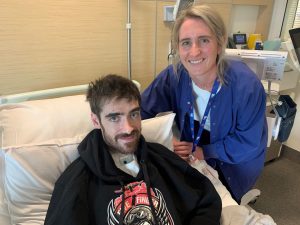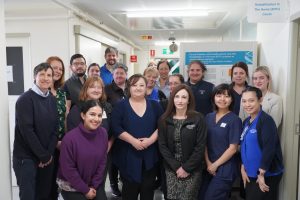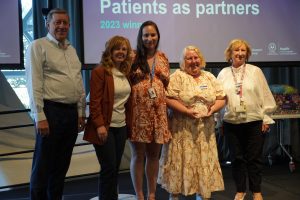In November, Seeta Gaston spent three weeks at The Queen Elizabeth Hospital receiving treatment for an infection in a disc of her lower back.
With her recovery requiring a further four weeks of treatment, she was offered the choice to either continue her treatment at TQEH or to return home and receive daily visits from a specialist nurse under the Infectious Disease Team, as part of Central Adelaide’s Hospital in the Home (HITH) program.
“I opted to go home,” the 72-year-old says.
Seeta’s treatment included intravenous antibiotics and regular blood monitoring, delivered into her arm through a thin tube dispensed from a small bottle carried around her waist.
“Each day I had a nurse visit me to flush the line and replace the antibiotic bottle.
“They also checked my blood pressure, my temperature and my oxygen levels.
“The nurses were all really lovely and if I had any questions, they were always able to answer them,” she says.
For many patients like Seeta, recovery and ongoing wellbeing is better supported in care settings outside of hospital.
“I was happy to get back to normal life and do normal everyday things like use my car to visit my family or go shopping.”
Central Adelaide’s Hospital in the Home Nurse Unit Manager, Louise Gordge, says the service provides acute nursing and medical care to patients in their home, as an alternative to being treated in hospital.
It allows patients to return home sooner or, in some instances, avoid a hospital admission altogether.
“We offer a service that allows patients to be cared for in the comfort of their own home,” Louise says.
“While recovering they can eat their own food, sleep in their own bed, feed their pets and return to their normal life, all while receiving hospital-standard care.
“It is especially important because they can be with their families at Christmas and share this time with their loved ones, as it is an important time of year for many people.”
Patients are still regarded as hospital inpatients and remain under the care of their hospital treating team with support provided by nurses, doctors or allied health professionals.
More than 1360 Central Adelaide patients have benefited from the HITH service this year. A further 80 elderly patients have been cared for under the new Geriatric in the Home program launched in August.
Only patients stable enough to receive their medical care at home are referred to HITH, which is voluntary and at no additional charge, Louise says.
“If the patient agrees, specialist nursing staff will come to their house, and if necessary allied health staff, with some patients receiving up to three visits each day with 24-hour phone support.
“Where possible and safe to do so, we always look for out-of-hospital care options so patients can be supported outside of an acute setting on their road to recovery.”
Research shows many patients, especially the elderly, face a longer recovery time the more days they spend in a hospital setting, she says.
“At home you are less likely to see yourself as sick, as you get up and do everyday tasks including getting dressed and making meals for yourself.
“These activities can improve your recovery and ensure you don’t lose functionality which is really important as it can be very difficult, particularly for elderly, to regain this conditioning.”



